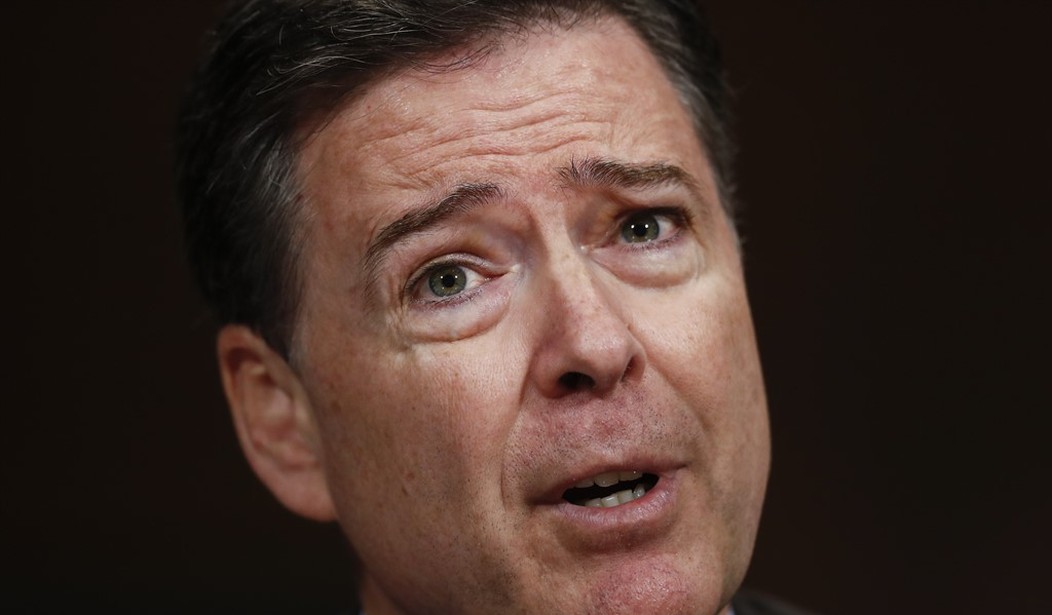Almost as soon as the executive-privilege trial balloon went up yesterday, the White House shot it down. Today, two sources within the administration tell the New York Times that Donald Trump won’t try to block former FBI director James Comey from testifying on Thursday with a privilege claim. The decision is both political and practical, as Trump may have provided a de facto waiver with his previous comments anyway:
President Trump does not plan to invoke executive privilege to try to prevent James B. Comey, the former F.B.I. director, from providing potentially damaging testimony to Congress on statements the president made about an investigation into his former national security adviser, two senior administration officials said Friday.
Mr. Trump could still move to block the testimony next week, given his history of changing his mind at the last minute about major decisions. But legal experts have said that Mr. Trump has a weak case to invoke executive privilege because he has publicly addressed his conversations with Mr. Comey, and any such move could carry serious political risks.
One of the administration officials said Friday evening that Mr. Trump wanted Mr. Comey to testify because the president had nothing to hide and wanted Mr. Comey’s statements to be publicly aired. The officials spoke on the condition of anonymity because they did not want to be identified discussing a decision that had not been announced.
In the full context of Kellyanne Conway’s interview with George Stephanopoulos yesterday, it was already clear that Trump wasn’t considering the option seriously. (That was Stephanopoulos’ conclusion, too.) That may be in part because of its less-than-certain application in this situation, but it’s not clear just how cloudy it would be. Executive privilege has a wide scope, but not a tremendous amount of precedent in terms of challenges. It’s possible that Congress could have sued the White House over a claim in order to get a judge to rule that Trump had waived the privilege by publicly characterizing the conversations already, but there seems to be no precedent for such an implied waiver. Besides, this Congress would be unlikely to sue the White House at all, and as usual in such situations, the federal courts would be reluctant to get in the middle of a political fight. The court intervened in Watergate and in Bill Clinton’s impeachment on executive-privilege claims, but in both cases there was evidence of actual criminal conduct rather than just speculation. Absent an obvious crime, the federal courts would be most likely to tell the other two branches to work it out between themselves.
The simpler answers are likely the best: Trump’s not going to invoke it because it would be politically disastrous to do so, and it also appears unnecessary to boot. If Trump truly attempted to obstruct justice in his mid-February meeting with Comey, the FBI director would have been required to report it to the Attorney General and/or Congress immediately, and Comey never did. In fact, he testified in early May that he had not been pressured at all for political purposes to end any investigation, which strongly suggests that Trump’s questions about Flynn were just clumsy attempts to help out a friend — as Comey also apparently thought at the time. Whatever Comey tells Congress isn’t going to get Trump in legal trouble, so the White House has seemingly (and wisely) concluded that it’s just better to get past it quickly.
That doesn’t mean Comey won’t do some political damage this week, though. ABC News reports that Comey has an axe to grind, and he’s going to get the blade as sharp as possible for his former superiors at the Department of Justice:
In the dead of winter several months ago — before either one officially joined the Justice Department — Jeff Sessions and Rod Rosenstein met to discuss replacing James Comey as FBI director. Then in a February meeting at the White House, Rosenstein and President Donald Trump further “discussed” Comey’s “deeply troubling” and “serious mistakes,” Rosenstein wrote in his now-infamous letter recommending that Comey be fired.
But it turns out Rosenstein and Sessions never discussed such concerns with one key person: Comey himself.
Specifically, according to sources familiar with the matter, at no point in the weeks and months before Comey’s termination did Deputy Attorney General Rosenstein or Attorney General Sessions tell Comey they were uneasy about his leadership or upset over what Rosenstein later called Comey’s “mistaken” decision to announce the results of the FBI investigation into Hillary Clinton’s private email server last year.
The failure to flag any such concerns to Comey before terminating him is part of what makes the former FBI director feel so blindsided. It’s also part of the story he’s planning to tell lawmakers next week when — barring a last-minute schedule change — he testifies publicly for the first time about his axing, and about alleged collusion between Trump associates and elements of the Russian government to influence last year’s presidential election.
That does seem a little odd. Normally, new management would review performance issues with existing staff before making drastic changes, so Comey has a legit beef on that point. However, it’s not as if these criticisms came out of nowhere either; House and Senate members of both parties had been publicly criticizing Comey for months, including his new boss, Jeff Sessions. It’s one thing to feel sore that neither Sessions nor Rosenstein spoke directly with him about these issues before his termination, but … blindsided? That’s overselling the point by a long way.
And that might be a tough sell in testimony to Congress, too.







Join the conversation as a VIP Member